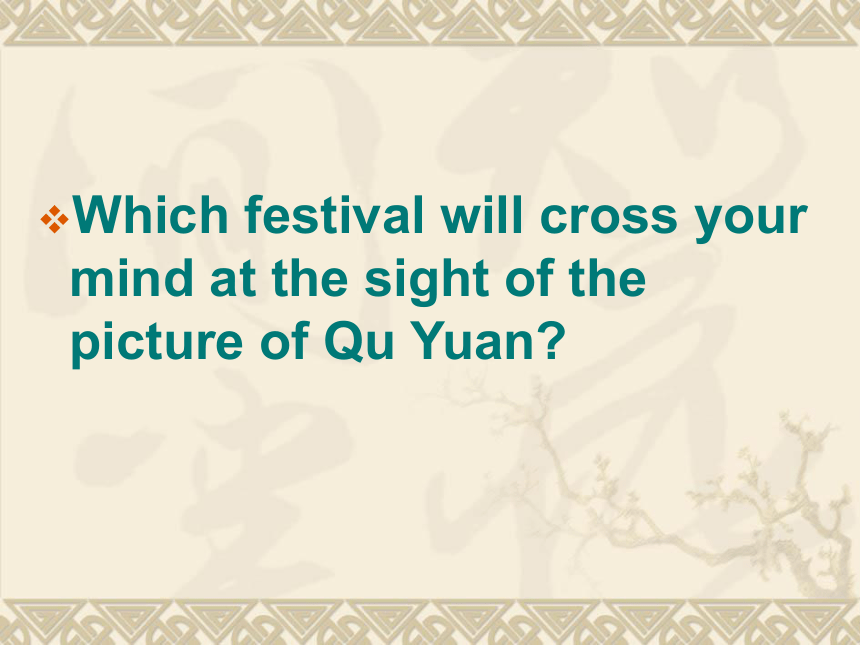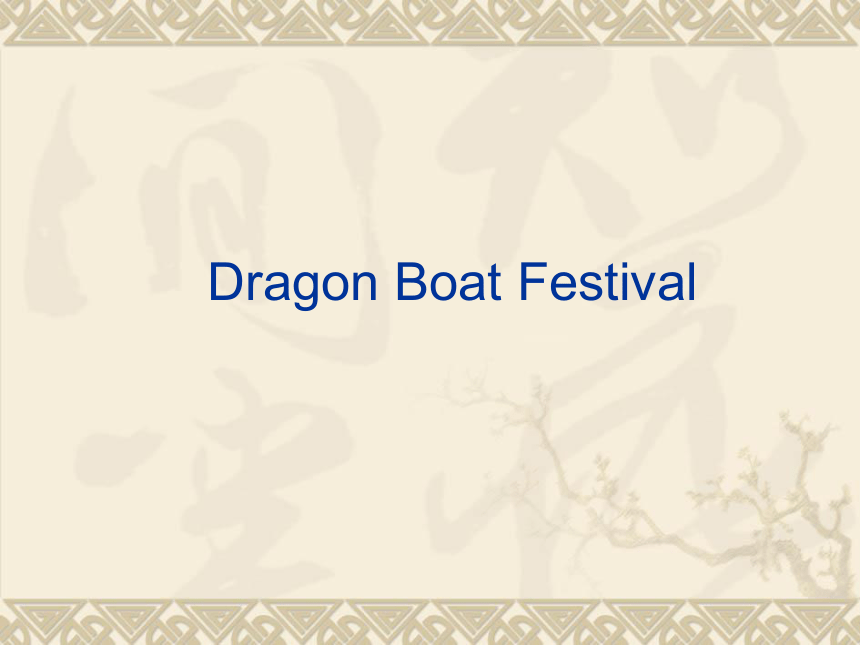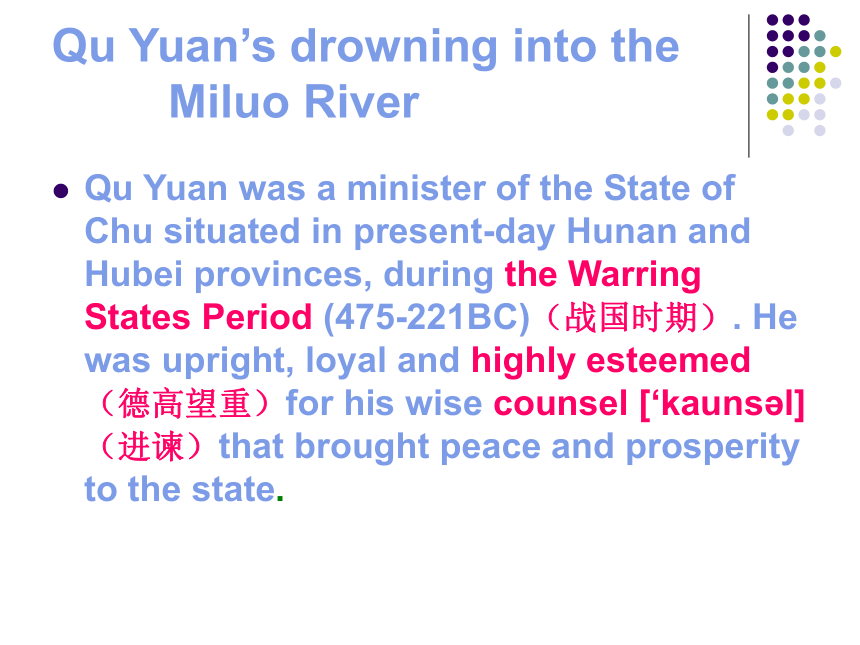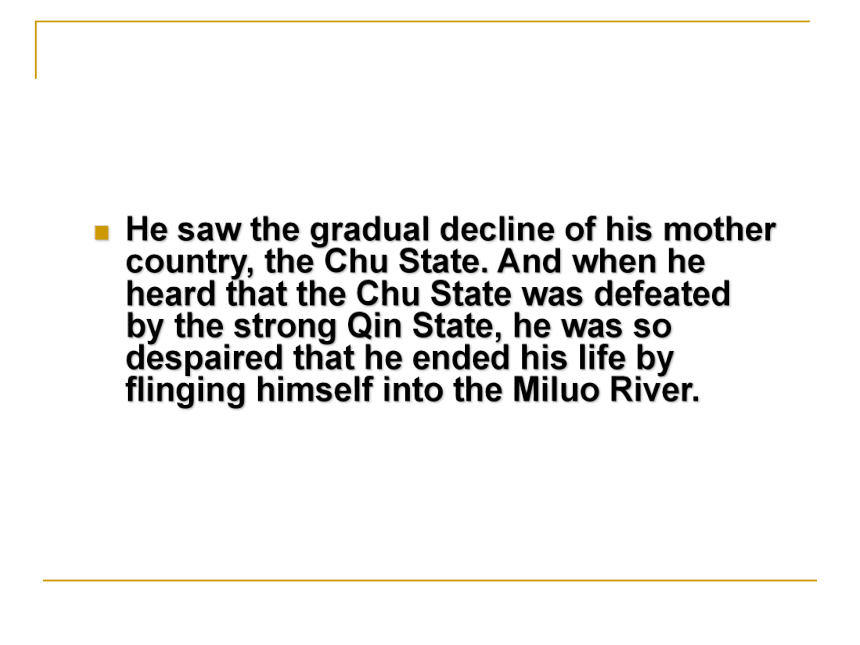Unit 3 Dragon-Boat Festival 课件
文档属性
| 名称 | Unit 3 Dragon-Boat Festival 课件 |

|
|
| 格式 | ppt | ||
| 文件大小 | 2.1MB | ||
| 资源类型 | 教案 | ||
| 版本资源 | 牛津上海版(试用本) | ||
| 科目 | 英语 | ||
| 更新时间 | 2020-06-12 00:00:00 | ||
图片预览












文档简介
(共37张PPT)
Module 1Unit 3
Dragon Boat Festival
Can you recognize this kind of plant
Mugwort plants 艾草
What do you think of when it comes to mugwort plants
Which festival will cross your mind at the sight of the picture of Qu Yuan
Dragon Boat Festival
About its names
The Dragon Boat Festival is also called the Duanwu Festival. Since it is celebrated on the fifth day of the fifth month according to the Chinese calendar, it earns another name — Double Fifth Festival.
Actually, it has a variety of names in Chinese.
List
端阳节、龙舟节、
女儿节、午日节、
五月节、艾节、
端五、重五、
夏节、天中节、
浴兰节、屈原日、诗人节
Its popularity
It is a popular and traditional festival celebrated by the Hans, Koreans, Mongolians, Huis, Yis, Bais, Miaos, Zhuangs and others, altogether 27 of the 56 nationalities in China.
The origins of
Dragon Boat Festival
There are a great many of legends about the origin of Dragon Boat Festival. The most popular theory of the origin of the festival is that it was derived from the activities commemorating [k ‘mem reiti ] (纪念)Qu Yuan. The story about Qu Yuan has been deeply rooted in Chinese culture and this festival, so it is definitely a very important factor for the origin of the festival.
Qu Yuan’s drowning into the
Miluo River
Qu Yuan was a minister of the State of Chu situated in present-day Hunan and Hubei provinces, during the Warring States Period (475-221BC)(战国时期). He was upright, loyal and highly esteemed (德高望重)for his wise counsel [‘kauns l] (进谏)that brought peace and prosperity to the state.
However, when a dishonest and corrupt prince vilified [‘vilifaid] (中伤) Qu Yuan, he was disgraced, dismissed from office, and eventually exiled. During his exile, Qu Yuan did not give up. He traveled extensively, taught and wrote about his ideas. His works, the Lament [l 'ment] (Li Sao), the Nine Chapters (Jiu Zhang), and Wen tian, are masterpieces and invaluable for studying ancient Chinese culture.
He saw the gradual decline of his mother country, the Chu State. And when he heard that the Chu State was defeated by the strong Qin State, he was so despaired that he ended his life by flinging himself into the Miluo River.
Legend says after people heard he drowned, they were greatly dismayed. Fishermen raced to the spot in their boats to search for his body. Unable to find his body, people threw zongzi, eggs and other food into the river to feed fish, hoping to secure his corpse. Since then, people started to commemorate Qu Yuan through dragon boat races, eating zongzi and other activities, on the anniversary of his death, the 5th of the fifth month.
This is said to be the origin of the present nation-wide custom, which is the common people’s expression of
grief over Qu’s
death.
But since some of the well-known traditions of the festival already existed even before Qu Yuan, other origins of the festival were also suggested.
Wen Yiduo suggested that the festival may be associated with dragon closely because two of the most important activities of the festival, dragon boat racing and eating zongzi, are related to dragon.
Another view is that the festival is originated from the taboo 禁忌 of evil days. The fifth month of the Chinese lunar calendar is traditionally considered an evil month and the 5th of the month is particularly a bad day, so a lot of taboo had been developed.
Customs
How do you celebrate the Dragon Boat Festival in your hometown
Zongzi
Zongzi is a pyramid dumpling made of glutinous [‘ɡlu:tin s] rice(糯米)wrapped in bamboo or reed (芦苇)leaves.
Zongzi
The people of Chu who mourned the death of Qu Yuan threw rice into the river to feed his ghost every year on the fifth day of the fifth month. But one year, the spirit of Qu Yuan appeared and told the mourners that a huge reptile [‘reptail](爬行动物)in the river had stolen the rice. The spirit then advised them to wrap the rice in silk and bind (绑) it with five different-colored threads before tossing (投) it into the river.
Ingredients of zongzi
Ingredients such as beans, lotus seeds(莲子), chestnuts(栗子), pork fat and the golden yolk [j uk] (蛋黄)of a salted duck egg are often added to the glutinous rice.
The dragon-boat races symbolize the many attempts to rescue and recover Qu‘s body. A typical dragon boat ranges from 50-100 feet in length, with a beam (梁)of about 5.5 feet, accommodating two paddlers seated side by side.
Dragon boat races
Today, people hold the race differently from place to place.
Here are some instances.
1. Along the Miluo River in Hubei Province, the festival celebrators hold a grand opening ceremony before the race starts.
2. At the ceremony dozonds of men in new clothes, with burning candles in hands, walk around boats three times to show worship of Lu Ban.
3.Then they carry, on their shoulders, an image of a dragon’s head to the Temple of Qu Yuan.
4. Finally, they tie red ribbons to the boats and pull them into the river for the race.
5. At the crack of a signal gun, the boats race ahead like discharged arrows fitted to bowstrings 弓弦.
Xiamen and Zhangzhou
In the areas of Xiamen and Zhangzhou of Fujian Province, a big wooden boat is arranged lying at the finishing line. When race boats reach the line, a number of ducks are released from the big wooden boat into the river for all the racers to catch amid [ ‘mid] (在… 之中)thunderous cheers of spectators on the banks.
Guangdong
Hanging mugwort plants
It is said that hanging mugwort plants can protect people from ill fortune.
This custom hangs an interesting folk tale. Towards the end of the Tang Dynasty (618-907) a nation-wide peasant uprising took place. It is said that one day its leader Huang Chao, commanding his army, came to present Dengxian County city of Henan Province to survey the terrain [‘terein ] (地形)for a battle.
Huang came across a panic-stricken woman who held a child about six years old in one arm and took a child about three years old by the hand. Puzzled, Huang dismounted from his horse and asked why she behaved so. The woman replied in a plaintive voice, “The older is an orphan and the younger is my own son. In case we run into Huang Chao’s soldiers, I would flee with the older alone at the sacrifice of my own son.”
Huang was moved by the reply, pulling up two mugwort plants at the roadside immediately and gave them to her. Huang added:“ Tell the poor residents in Dengzhou city to hang this kind of mugwort plants on their doors. Seeing this sign, my soldiers will not kill them. ” the next day, Huang Chao’s army captured Dengzhou city, killed the magistrate [‘m d istrit] (地方官员),and distributed grain from the official granaries [’ɡr n ri] (谷仓)to the poor. That day happened to be the Dragon Boat Festival; hence the custom of hanging mugwort plants on doors.
Drinking realgar [ri‘ lɡ ](雄黄)wine
It is said that, on the day of Qu Yuan’s death, an old practitioner of Chinese medicine poured a jar of realgar wine into the Miluo River, supposedly to make drunk the dragon and other aquatic animals which might devour Qu Yuan’s corpse.
Yet the present custom is a little different from what it used to be. At the festival, adults of a family drink it as a prevention against vermin [‘v :min] (害虫)and children, who are unfit to drink wine, have some of the wine applied to their noses and ears for the same purpose.
People also like to sprinkle the wine over their floors for sterilization [sterilai’zei∫ n] (杀菌)on that day.
World Heritage
The Dragon Boat Festival comprising ceremonies, dances, performances, games, and the preparation of food and beverages, is carried out in an atmosphere of harmony that strengthens social cohesion [k u‘hi: n] (凝聚力), and is regarded and transmitted by Chinese from generation to generation as part of our cultural identity.
Module 1Unit 3
Dragon Boat Festival
Can you recognize this kind of plant
Mugwort plants 艾草
What do you think of when it comes to mugwort plants
Which festival will cross your mind at the sight of the picture of Qu Yuan
Dragon Boat Festival
About its names
The Dragon Boat Festival is also called the Duanwu Festival. Since it is celebrated on the fifth day of the fifth month according to the Chinese calendar, it earns another name — Double Fifth Festival.
Actually, it has a variety of names in Chinese.
List
端阳节、龙舟节、
女儿节、午日节、
五月节、艾节、
端五、重五、
夏节、天中节、
浴兰节、屈原日、诗人节
Its popularity
It is a popular and traditional festival celebrated by the Hans, Koreans, Mongolians, Huis, Yis, Bais, Miaos, Zhuangs and others, altogether 27 of the 56 nationalities in China.
The origins of
Dragon Boat Festival
There are a great many of legends about the origin of Dragon Boat Festival. The most popular theory of the origin of the festival is that it was derived from the activities commemorating [k ‘mem reiti ] (纪念)Qu Yuan. The story about Qu Yuan has been deeply rooted in Chinese culture and this festival, so it is definitely a very important factor for the origin of the festival.
Qu Yuan’s drowning into the
Miluo River
Qu Yuan was a minister of the State of Chu situated in present-day Hunan and Hubei provinces, during the Warring States Period (475-221BC)(战国时期). He was upright, loyal and highly esteemed (德高望重)for his wise counsel [‘kauns l] (进谏)that brought peace and prosperity to the state.
However, when a dishonest and corrupt prince vilified [‘vilifaid] (中伤) Qu Yuan, he was disgraced, dismissed from office, and eventually exiled. During his exile, Qu Yuan did not give up. He traveled extensively, taught and wrote about his ideas. His works, the Lament [l 'ment] (Li Sao), the Nine Chapters (Jiu Zhang), and Wen tian, are masterpieces and invaluable for studying ancient Chinese culture.
He saw the gradual decline of his mother country, the Chu State. And when he heard that the Chu State was defeated by the strong Qin State, he was so despaired that he ended his life by flinging himself into the Miluo River.
Legend says after people heard he drowned, they were greatly dismayed. Fishermen raced to the spot in their boats to search for his body. Unable to find his body, people threw zongzi, eggs and other food into the river to feed fish, hoping to secure his corpse. Since then, people started to commemorate Qu Yuan through dragon boat races, eating zongzi and other activities, on the anniversary of his death, the 5th of the fifth month.
This is said to be the origin of the present nation-wide custom, which is the common people’s expression of
grief over Qu’s
death.
But since some of the well-known traditions of the festival already existed even before Qu Yuan, other origins of the festival were also suggested.
Wen Yiduo suggested that the festival may be associated with dragon closely because two of the most important activities of the festival, dragon boat racing and eating zongzi, are related to dragon.
Another view is that the festival is originated from the taboo 禁忌 of evil days. The fifth month of the Chinese lunar calendar is traditionally considered an evil month and the 5th of the month is particularly a bad day, so a lot of taboo had been developed.
Customs
How do you celebrate the Dragon Boat Festival in your hometown
Zongzi
Zongzi is a pyramid dumpling made of glutinous [‘ɡlu:tin s] rice(糯米)wrapped in bamboo or reed (芦苇)leaves.
Zongzi
The people of Chu who mourned the death of Qu Yuan threw rice into the river to feed his ghost every year on the fifth day of the fifth month. But one year, the spirit of Qu Yuan appeared and told the mourners that a huge reptile [‘reptail](爬行动物)in the river had stolen the rice. The spirit then advised them to wrap the rice in silk and bind (绑) it with five different-colored threads before tossing (投) it into the river.
Ingredients of zongzi
Ingredients such as beans, lotus seeds(莲子), chestnuts(栗子), pork fat and the golden yolk [j uk] (蛋黄)of a salted duck egg are often added to the glutinous rice.
The dragon-boat races symbolize the many attempts to rescue and recover Qu‘s body. A typical dragon boat ranges from 50-100 feet in length, with a beam (梁)of about 5.5 feet, accommodating two paddlers seated side by side.
Dragon boat races
Today, people hold the race differently from place to place.
Here are some instances.
1. Along the Miluo River in Hubei Province, the festival celebrators hold a grand opening ceremony before the race starts.
2. At the ceremony dozonds of men in new clothes, with burning candles in hands, walk around boats three times to show worship of Lu Ban.
3.Then they carry, on their shoulders, an image of a dragon’s head to the Temple of Qu Yuan.
4. Finally, they tie red ribbons to the boats and pull them into the river for the race.
5. At the crack of a signal gun, the boats race ahead like discharged arrows fitted to bowstrings 弓弦.
Xiamen and Zhangzhou
In the areas of Xiamen and Zhangzhou of Fujian Province, a big wooden boat is arranged lying at the finishing line. When race boats reach the line, a number of ducks are released from the big wooden boat into the river for all the racers to catch amid [ ‘mid] (在… 之中)thunderous cheers of spectators on the banks.
Guangdong
Hanging mugwort plants
It is said that hanging mugwort plants can protect people from ill fortune.
This custom hangs an interesting folk tale. Towards the end of the Tang Dynasty (618-907) a nation-wide peasant uprising took place. It is said that one day its leader Huang Chao, commanding his army, came to present Dengxian County city of Henan Province to survey the terrain [‘terein ] (地形)for a battle.
Huang came across a panic-stricken woman who held a child about six years old in one arm and took a child about three years old by the hand. Puzzled, Huang dismounted from his horse and asked why she behaved so. The woman replied in a plaintive voice, “The older is an orphan and the younger is my own son. In case we run into Huang Chao’s soldiers, I would flee with the older alone at the sacrifice of my own son.”
Huang was moved by the reply, pulling up two mugwort plants at the roadside immediately and gave them to her. Huang added:“ Tell the poor residents in Dengzhou city to hang this kind of mugwort plants on their doors. Seeing this sign, my soldiers will not kill them. ” the next day, Huang Chao’s army captured Dengzhou city, killed the magistrate [‘m d istrit] (地方官员),and distributed grain from the official granaries [’ɡr n ri] (谷仓)to the poor. That day happened to be the Dragon Boat Festival; hence the custom of hanging mugwort plants on doors.
Drinking realgar [ri‘ lɡ ](雄黄)wine
It is said that, on the day of Qu Yuan’s death, an old practitioner of Chinese medicine poured a jar of realgar wine into the Miluo River, supposedly to make drunk the dragon and other aquatic animals which might devour Qu Yuan’s corpse.
Yet the present custom is a little different from what it used to be. At the festival, adults of a family drink it as a prevention against vermin [‘v :min] (害虫)and children, who are unfit to drink wine, have some of the wine applied to their noses and ears for the same purpose.
People also like to sprinkle the wine over their floors for sterilization [sterilai’zei∫ n] (杀菌)on that day.
World Heritage
The Dragon Boat Festival comprising ceremonies, dances, performances, games, and the preparation of food and beverages, is carried out in an atmosphere of harmony that strengthens social cohesion [k u‘hi: n] (凝聚力), and is regarded and transmitted by Chinese from generation to generation as part of our cultural identity.
同课章节目录
- Module 1 City life
- Unit 1 Great cities in Asia
- Unit 2 At the airport
- Unit 3 Dragon Boat Festival
- Unit 4 Staying healthy
- Module 2 Changes
- Unit 5 What will I be like?
- Unit 6 Seasonal changes
- Unit 7 Travelling in Garden City
- Module 3 The nature world
- Unit 8 Windy weathe
- Unit 9 Sea water and rain wate
- Unit 10 Forests and land
- Unit 11 Controlling fire
